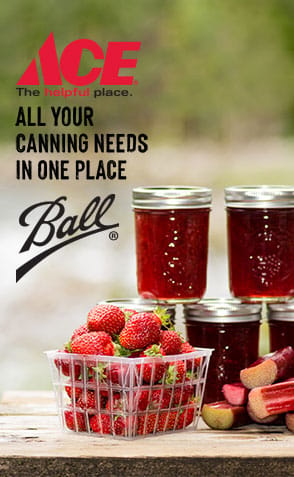Change Address
Edit Address*Indicates required field
Add New Address*Indicates required field
Used only to contact you about your order.
Modal Title Placeholder
Ace Rewards members are eligible to receive free delivery on orders of $50 or more. Free delivery offer excludes same day delivery. Participation and delivery area vary by store.
Our delivery program lets you get the qualifying items delivered from the store to your door by a helpful Ace associate.
FREE for Ace Rewards Members on Orders $50+
Sign In/Join Now
Service Fee may apply, see cart for details.
Not a member? You can still receive delivery on qualifying items for a fee. The fee is determined at checkout.
Handling Fee may be applied based on order quantity.
Participation and delivery area vary by store.
- All deliveries are placed at the property enterance.
- Requests for orders to be placed beyond the first threshold/entryway may require an additional fee at the local store's discretion.
- For more information, see our Customer Service page.
*Ace Rewards members spending $50 or more are eligible to receive free Next Day delivery on in-stock orders. Orders must be placed on days the store is open, before 4pm local time or 2 hours before store closing time, whichever is earlier.
Soil Conditioners (67 items found)
Filter
- In stock today at:
- $to$Enter valid price range.
- Revive All-Purpose Lawn Fertilizer For All Grasses 5000 sq ft14 Reviews$27.99 27.99 USDFree Store Pickup Today
- Lilly Miller Super Sweet Sweet Lime Conditioner 2000 sq ft 25 lb9 Reviews$18.99 18.99 USDFree Store Pickup Today
- Western Mining and Minerals Organic Lawn and Garden Gypsum 40 lb5 Reviews$13.99 13.99 USDFree Store Pickup Today
- Soil Doctor Ziplime Organic Dolomite Lime 5000 sq ft 30 lb2 Reviews$12.99 12.99 USDFree Store Pickup Today
- Whitney Farms Organic Soil Conditioner 8 sq ft 28.3 L4 Reviews$7.99 7.99 USDFree Store Pickup Today
- Sunniland Super Iron Plus All-Purpose Lawn Fertilizer For All Grasses 4000 sq ft3 Reviews$18.99 18.99 USDFree Store Pickup Today
- Revive All-Purpose Lawn Fertilizer For All Grasses 2000 sq ft5 Reviews$19.99 19.99 USDFree Store Pickup Today
- Earth Science Growth Essentials Garden Gypsum 500 sq ft 2.5 lb1 Review$12.99 12.99 USDFree Store Pickup Today
- Earth Science Fast Acting Garden Lime 500 sq ft 2.5 lb4 Reviews$12.99 12.99 USDFree Store Pickup Today
- Soil Doctor EZ Spread Organic Lime 1000 sq ft 40 lb4 Reviews$9.99 9.99 USDFree Store Pickup Today
- Earth Science Growth Essentials Soil Sulphur 500 sq ft 2.5 lb1 Review$12.99 12.99 USDFree Store Pickup Today
- Earth Science Fast Acting Iron Treatment 500 sq ft 2.5 lb0 Reviews$12.99 12.99 USDFree Store Pickup Today
- Earth Science Growth Essentials Organic Earthworm Castings 4 lb0 Reviews$17.99 17.99 USDFree Store Pickup Today
- Revive All-Purpose Lawn Fertilizer For All Grasses 4000 sq ft7 Reviews$21.99 21.99 USDFree Store Pickup Today
- Hydretain Organic Moisture Manager Soil Treatment 6000 sq ft 15 lb0 Reviews$49.99 49.99 USDFree Store Pickup Today
- Hydretain Organic Moisture Manager Soil Treatment 6000 sq ft 15 lb0 Reviews$49.99 49.99 USDFree Store Pickup Today
Showing 30 of 67
Poor soil conditions can wreak havoc on your lawn. Whether you're dealing with sandy soil, soil with excessive clay, nutrient-depleted soil or a combination of these issues, Ace Hardware carries a variety of soil conditioners for lawns. Learn about the most common types of soil conditioners to make the right decision for your yard.
What is Soil Conditioner?
A soil conditioner is any type of material that can be added to soil to improve its properties, such as drainage, aeration, water retention and permeability. Unlike fertilizers, which add nutrients to soil, soil enhancers promote an ideal environment for roots and plants to thrive by changing the condition of the soil itself. Some soil conditioners reduce compaction to enable nutrients, minerals and water to move without restriction and reach plant roots.
Other soil treatments help to maintain moisture and the proper pH balance of soil. Plants rely on a variety of nutrients to maintain normal, healthy growth, and many of these nutrients come from soil. Soil pH plays a key role in determining whether your plants, edibles and grasses will get the essential nutrients they need to flourish.
Lime Soil, Perlite and Other Soil Conditioners for Lawns
There are several types of soil additive options available in today's market, like lime for garden soil, iron sulfate and more. Each type of conditioner for soil may play a different role in promoting healthy lawn grasses and plants. Some of the most common types of lawn conditioners include:
- Garden lime: Using a pulverized lime soil treatment can help restore the optimum pH balance of soil, plants and grasses. Lime in the soil works to raise pH levels, which is particularly useful for overly acidic soils.
- Perlite soil: This soil additive improves aeration and drainage. Perlite soil conditioners also improve soil structure and reduce soil compaction.
- Soil sulfur: For soils with higher pH levels, soil sulfur conditioners offer a cost-effective way to lower pH levels. Soil sulfur is necessary for the formation of chlorophyll.
- Iron sulfate for lawns: Recommended for the prevention and correction of chlorosis, iron sulfate soil treatments aid in creating acidic soil conditions where lawns, plants and shrubs can thrive.
- Gypsum: Gypsum soil conditioners may improve the aeration of compact soils, which can help water drain more efficiently. Gypsum is a great soil conditioner for clay soil.
- Aluminum sulfate: For use on plants and shrubs that require higher acidity levels such as azaleas, camellias, hydrangeas and junipers, aluminum sulfate for plants helps to acidify soil.
In addition to lime for gardening soil and other soil enhancers, Ace offers seed starting mix options to help your seedlings germinate. Their light composition and water retention abilities are great for germination and root growth.
Inorganic Vs. Organic Soil Conditioner
The two broad categories of soil conditioners include inorganic and organic options.
- Inorganicsoil conditioners: Also known as synthetic conditioners, they are created from petroleum products or various natural sources. Because they are man-made, synthetic conditioners tell you exactly what is in them, providing high precision in lawn care efforts. They are also relatively affordable compared to organic conditioners.
- Organicsoil conditioner: Organic soil conditioner comes from live, organic matter such as grass clippings, wood chips, compost, manure, or straw. Over time, organic soil conditioners may improve both the nutrient- and water-holding capacity of soil.
While inorganic soil conditioners may be more affordable and precise, using too much too soon may damage your soil.
Soil Enhancers and Test Kits
Your soil's pH levels are constantly changing. While you can determine some qualities of your soil by monitoring its consistency, soil testing can provide an easy way to understand your soil's pH levels, texture and other important qualities. Soil testing results also offer recommendations about the types of soil conditioners your yard and garden may need.
At Ace, you’ll find kits available from brands like Earth Science, Hi-Yield, Miracle-Gro and Scotts.
Shop Soil Conditioners Near You at Ace
Improve the condition of your yard by browsing our selection of grass seeds, weed killers and fungicides. We also carry a wide variety of lawn care and gardening supplies, like sprayers for fertilizers and gardening tools, that’ll help you give your yard the best care possible. Shop the array of soil test kits, lime for soil and soil conditioners near you at Ace or online today.





























